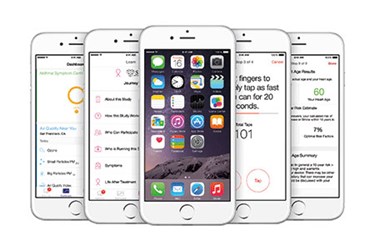Apple's ResearchKit Aims To Catalyze Medical Research Through Apps
By Jof Enriquez,
Follow me on Twitter @jofenriq

Apple this week unveiled ResearchKit — a new, open-source software platform for creating mobile medical apps that collect health information from iPhone users. The data will be used to facilitate medical studies. ResearchKit could transform the iPhone from a communications device into a diagnostic tool that has the potential to boost medical research.
With permission from users, Apple would cull information from custom-built apps and share the data with doctors and researchers to boost research studies, said Apple CEO Tim Cook at a recent Apple event held in San Francisco, according to Bloomberg.
While most medical studies have to make do with using small samples, ResearchKit would be able to tap data from a far more diverse population. With ResearchKit, medical researchers can design apps that can be easily downloaded by millions of iOS users, speeding recruiting for research studies and making data more accurate and reliable. Moreover, Apple believes that many iPhone users will be willing to give their consent to share sensitive health information, if given the means to quickly do so.
Apple’s apps “already help millions of customers track and improve their health,” said Jeff Williams, Apple’s senior VP of operations, in a statement cited in the Bloomberg report. “With hundreds of millions of iPhones in use around the world, we saw an opportunity for Apple to have an even greater impact by empowering people to participate in and contribute to medical research.”
ResearchKit will not be available until April, but Apple recently unveiled the first five medical testing apps built using the platform. Apple worked with a dozen medical organizations, including the University Of Oxford, Mount Sinai Hospital, and Stanford University, to build them. The apps are essentially tests to detect signs of five conditions — Parkinson’s, diabetes, cardiovascular disease, asthma, and breast cancer — according to TechCrunch.
"Tests designed with ResearchKit use the iPhone’s sensors to record data. The touch screen can feel people tapping in rhythm to detect inconsistencies that may signal a disease. The accelerometer can compare the gait and balance of someone’s walk against a healthy person’s speed and posture. And the microphone can notice minute fluctuations in someone’s voice that may indicate Parkinson’s or another health problem," according to TechCrunch.
Aware of privacy concerns, especially in handling health information, Apple said during the event that the company itself would not be able to see the anonymized health data collected through its platform. It is also giving participants a straightforward way to facilitate the process of giving researchers informed consent. Instead of the tedious personal interaction done in traditional studies, researchers could secure consent remotely via apps, without having to meet participants in person.
"What we get with ResearchKit is the unshackling of science from those bricks and mortar constraints, so we can do something much more scalable," Corey Bridges, CEO of LifeMap Solutions, a mobile health company that partnered with Mount Sinai Hospital to build the asthma app, told The Verge.
Apple's ResearchKit would also pull data from the related HealthKit platform. Announced last year, HealthKit is designed to facilitate the exchange of health data between medical devices used at home and electronic health records used by doctors and hospitals.
Image credit: Apple
